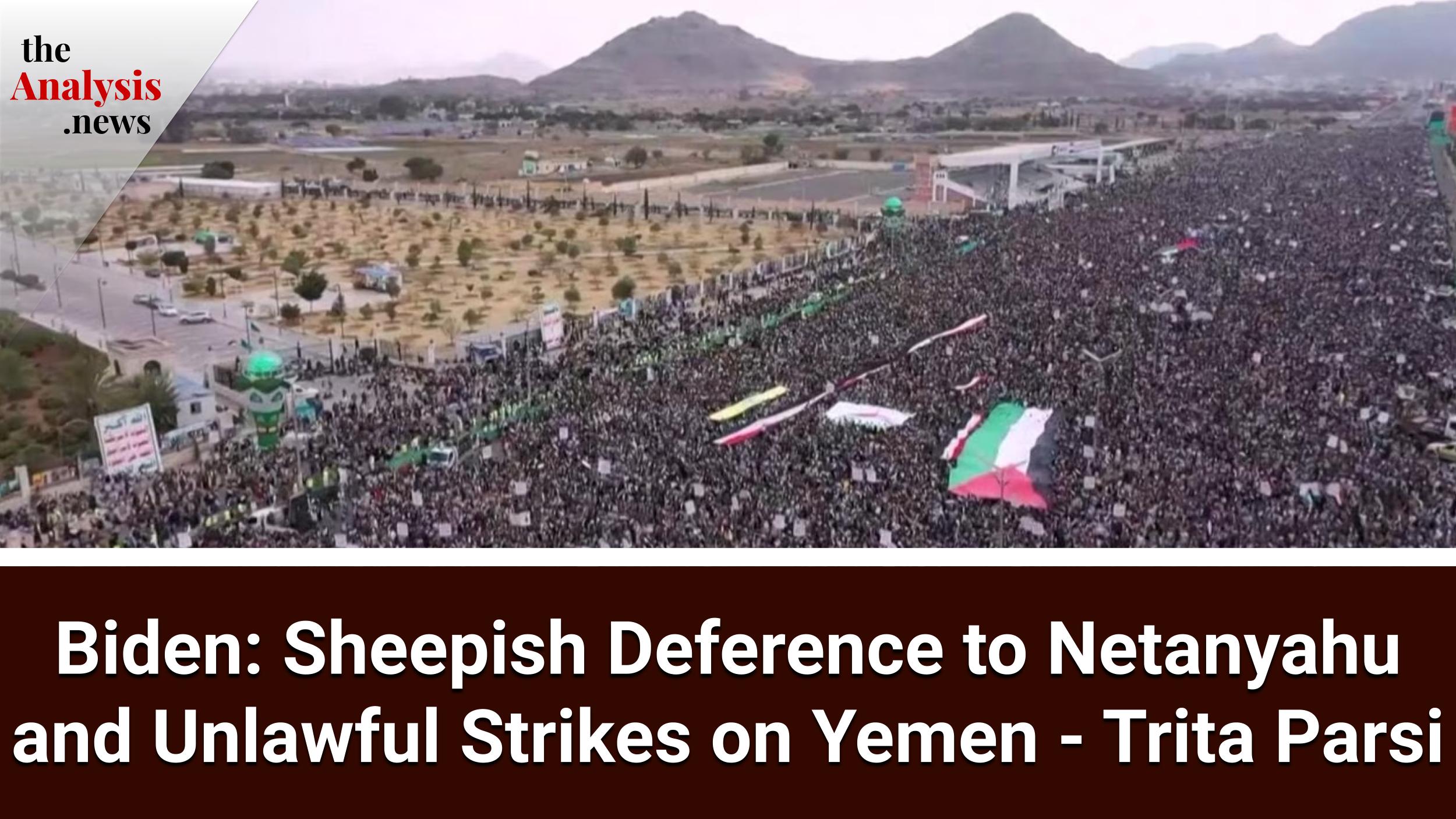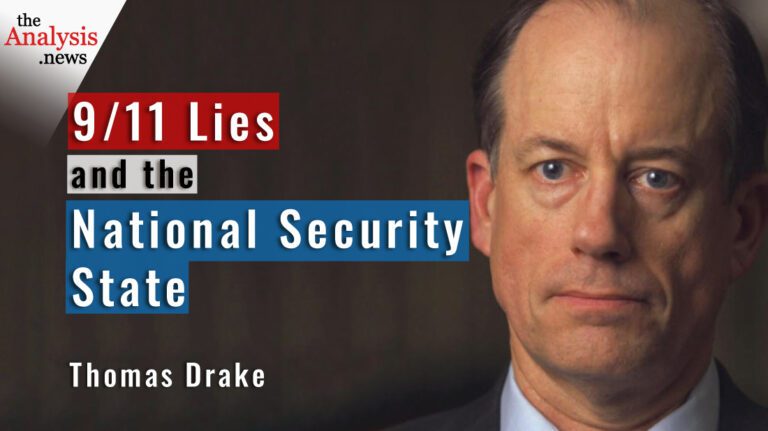Dr. Trita Parsi, Executive Vice President at the Quincy Institute for Responsible Statecraft, says the U.S. and U.K. bombing of Yemen is illegal. He highlights the U.S. and U.K.’s spin doctoring of the Houthi’s stated objective of attacking commercial ships in the Red Sea until a ceasefire in Gaza is reached. He criticizes Biden’s disdain for obtaining Congressional authorization to launch offensive strikes in Yemen, Iraq, and Syria.
Talia Baroncelli
Hi, I’m Talia Baroncelli, and you’re watching theAnalysis.news. I’ll shortly be joined by Dr. Trita Parsi to speak about Israel’s ongoing bombardment of the Gaza Strip, as well as the U.S. and U.K.’s unlawful attacks on Yemen.
We can’t make this show without you, so we’re thankful for your contributions. You can make a donation by going to our website, theAnalysis.news, and hitting the donate button at the top right corner of the screen. Make sure you get onto our mailing list and like and subscribe to the show wherever you watch or listen to the show, be it on YouTube or on podcast streaming services such as Apple or Spotify. See you in a bit with Trita Parsi.
At the World Economic Forum, New York Times opinion columnist Thomas Friedman spoke to Secretary of State Antony Blinken about the death toll in Gaza. He asked Blinken whether “Jewish lives matter more than Palestinian and Muslim lives, Muslim and Palestinian Christian lives, given the incredible asymmetry in casualties?” Blinken emphatically responded, “No, period. For me, I think for so many of us, what we’re seeing every single day in Gaza is gut-wrenching. And the suffering we’re seeing among innocent men, women, and children breaks my heart. The question is: What is to be done?”
Well, most people would say you don’t need to look too far for an answer to that question, namely that an immediate ceasefire is needed in the Gaza Strip, as well as a facilitation of extensive humanitarian aid and a release of all the Israeli hostages held by Hamas. The release of Palestinians in so-called administrative detention, which amounts to being taken hostage, is also required, as argued by Knesset member Dr. Ofer Cassif. The IDF’s bombardment of Palestinian civilians, however, has not been successful in getting the hostages released. Yet, it has been successful in inflicting more death and destruction over just a few weeks period in Gaza as the allied bombing of Dresden in a two-year period.
South Africa’s historic plea for interim measures at the International Court of Justice to halt Israel’s violations of its obligations under the 1948 Genocide Convention extensively documents the killing and starvation of Palestinians, as well as statements made by Israeli officials, which clearly express their genocidal intent.
One of South Africa’s lawyers has referred to a statement made by the World Food Program’s Chief Economist, Arif Husain, in which he said, “I’ve been doing this for the past two decades, and for me, the situation in Gaza is unprecedented.” He concluded that he had never seen anything like this in terms of severity, in terms of scale, and in terms of speed.
I’ll point to an additional comment made by Blinken in that World Economic Forum interview, which I believe is quite revealing of the U.S.’s hegemonic mindset, and I quote:
“We know that if we’re not engaged, if we’re not leading, then one of two things: Either someone else is, and just from the perspective of an American, that probably means that that’s going to happen in a way that may not reflect our own interests and values; or, even worse maybe, no one is. And then you’ve got a vacuum.”
Joining me now is Trita Parsi, the Executive Vice President at the Quincy Institute for Responsible Statecraft. Thanks again for joining me.
Trita Parsi
Thank you.
Talia Baroncelli
Well, let’s start off with the recent unlawful strikes on Yemen. The U.S. and U.K. have both launched strikes on Yemen to damage anti-ballistic missile launchers as well as drone capabilities in Yemen in order to prevent the Houthis from launching attacks on commercial vessels in the Red Sea.
Admiral John Kirby, from the National Security Council, has said that these strikes in no way serve as an escalation and that they are proportionate.
Similarly, British Prime Minister Mr. Rishi Sunak has said that strikes are necessary and that these strikes were conducted in self-defense in order to preserve the integrity of British vessels and the British economy. Most strikingly, he said that the Houthis attacks have nothing to do with Israel’s bombardment of Gaza, even though the Houthis themselves have explicitly said that they would stop their attacks if there were to be a ceasefire in Gaza. Is the U.S. and U.K. leadership deliberately trying to mislead the public here as to the reasons for the Houthi attacks?
Trita Parsi
You’re quite right. This is just patently false. I think from their standpoint, they have to come up with these lies because otherwise, people will start asking questions. Hold on, if the objective is to open up the seaways and make sure that there are no attacks against shipping, then there was a diplomatic option. This was to go for a ceasefire, which incidentally serves U.S. interests even better. But you didn’t do that. You didn’t even try that. Immediately, you went for a military action, which means that not only are you going for an approach that is far less likely to be successful but far more likely to be counterproductive. When you say that war is the option of last resort, you first have to exhaust diplomacy. Well, you just made a mockery of that because you didn’t try diplomacy, and you went for military actions as the first resort.
I think if you take a look at how mainstream media has covered this, up until just a few days ago, the vast majority of them didn’t even mention that the Houthi demand was a ceasefire. They made it look as if the Houthis are doing this because they’re evil, and they hate us for who we are and all that nonsense. This means that it’s not as if the media had to endorse a ceasefire. They should certainly have scrutinized as to whether the Houthis would live up to a ceasefire. They were actually depriving the public of knowledge that was their demand and knowledge that there may be an option to actually calm down the situation in the Red Sea through a ceasefire. At least the public has a right to know that that’s an option, whether that’s the option they should go for, whether there are problems with the option; that’s a different story. But its existence should be something that the media should report. Instead, they were actually hiding it.
That certainly serves the administration because a narrative was created. New York Times wrote that Biden felt that he had no choice. His hands were tied. Absolutely not. He tied his own hands. On top of that, it’s been utterly counterproductive because once the U.S. started shooting at the Houthis, first of all, Houthis attacks have now intensified. They’re happening more often than they did before. Also, the Houthis were not attacking American ships before; now they are. It also meant that the temperature in the region just went up, and it made it actually more easy. The blockade of the Red Sea became more effective because less ships were now willing to travel through the Red Sea because there is a shooting war between the U.S. and the Houthis. So, it actually serves the Houthi’s purpose of closing down the straits.
Now, the administration doesn’t have an exit plan on how to get out of this. It’s a huge mistake, in my view, counterproductive and completely counters what the administration says that it wants and that it’s seeking, which is a de-escalation.
Talia Baroncelli
Of course, there’s so much seaborne oil trade that goes through the Red Sea. I believe Shell and some other companies have said that they’re not going to send their commercial vessels through the Red Sea. It doesn’t make any sense for the U.S. to continue these attacks, thinking that global trade would just resume by them initiating a few attacks and that they wouldn’t actually have to continue or conduct additional attacks. This seems to set up the playing field for further attacks, doesn’t it?
Trita Parsi
It certainly does because the idea that a few strikes would deter the Houthis; I mean, the Saudis were bombing the Houthis with the U.S.’s help for eight years without succeeding. The idea that a few strikes would get the Houthis to back off was, of course, nonsensical at the outset. If you then have to completely degrade their capacity, then we’re talking about a major, major military operation, much more than taking out a couple of satellites and launching pads, etc. Then we’re talking about, essentially, a major war there. Again, this makes no sense, but it fits the pattern of what the Biden administration has done, which is to look at every possible avenue, every option, except the most obvious one, which is to go for cease fire.
Talia Baroncelli
What do you make of this current administration’s contempt for Congress? Article 1 of the Constitution says that you need to get authorization for Congress in order to launch attacks or to use force. Clearly, they haven’t done that here. Some experts are saying, “Oh, this is a very exceptional circumstance, which doesn’t require that the War Powers Act be followed and that Congress is consulted on this because this is an instance of an imminent threat to United States national security.” That’s complete nonsense here because you can’t introduce vessels into an area where they are increasing attacks and hostilities. Then if that vessel happens to be hit, then say, “Oh, this is an instance of national security. We need to get involved and bypass Congress.”
Trita Parsi
Then, on top of that, again, there were no attacks against U.S. ships, which would be different. If there had been, then at least there would be a basis for saying self-defense, but that wasn’t the case. I think, in that sense, the administration here is not different from previous ones who have, with comfort, bypassed Congress. It’s really up to Congress to assert itself and assert its authority. There are a few members that are trying hard to do so, both on the Republican and on the Democratic side, Tom Massie, Ro Khanna, of course, on the Democratic side, but so far, not the type of a majority that is needed to actually rebalance the relationship between Congress and the executive branch and make it as it was supposed to be according to the Constitution.
Talia Baroncelli
Well, let’s turn back to the issue that’s on everyone’s minds right now, that being Israel’s ongoing ethnic cleansing and bombardment of the Palestinians. Of course, we saw South Africa present a very convincing case against Israel at the ICJ, arguing that it is plausible that Israel is in violation of its obligations under the 1948 Genocide Convention and that acts leading to genocide are currently taking place.
We won’t go into the details of that case, but there have been other calls for transparency in the U.S. Incidentally, Senator Bernie Sanders, who has not called for a ceasefire, but he’s been calling for more transparency and an investigation on the ground, has been rebuked. His recent resolution would look into whether human rights violations are being committed as a result of or tied to weapons supplied by the U.S. to Israel. This resolution was rejected in the Senate. Admiral John Kirby also said that this investigation wouldn’t even be necessary as Israel will soon be scaling back its operation in the Gaza Strip. But it’s really hard to believe that, given Prime Minister Netanyahu’s recent admission that he would not support the creation of a Palestinian state, that he wouldn’t support any pathway toward the creation of a two-state solution, and that the IDF would not be scaling back its operations in the Gaza Strip. Can we really rely on the Biden administration here to do anything towards enacting a ceasefire?
Trita Parsi
I think the Biden administration certainly can do something, but so far has chosen not to. It has chosen to let the Israelis lead. The Israelis, under Netanyahu, do not have an interest in creating a Palestinian state. They flat-out reject it. Netanyahu has no interest in ending the war. He wants to drag it out as long as possible because the minute the war ends, his political career ends. The Biden administration essentially signed up for the Israeli plan before even knowing what it was. That’s a major mistake. The Israelis don’t have an exit strategy. In some aspects, their strategy is not to have an exit. The U.S. is now bound up in it because the Biden administration has chosen not to assert its own independence. At some point, I think we’ll be forced to do so, and it will become even more costly than it would have been had he done something from the very beginning.
Talia Baroncelli
Well, what do you make then in light of Netanyahu’s statements? What do you make of this recent purported Arab League plan, which the Financial Times was reporting on, saying that Arab League countries have been trying to negotiate a ceasefire, the release of hostages, as well as the establishment of a Palestinian state in return for normalization with Israel? Is this just something that’s a pipe dream right now?
Trita Parsi
I think it is. I mean, look, anything that doesn’t create a Palestinian state, a viable Palestinian state, not whatever the American side has proposed so far, which is far less than an actual state, anything that is going in that direction is either not going to work immediately, or it actually will make the situation worse in the long run.
Take a look at what is happening here. This whole thing is partly a result of the fact that the United States under Trump signed on to Netanyahu’s vision and analysis, which was the Palestinians no longer matter. Instead, let’s do normalization deals with other Arab states, get economic links with them, and create an anti-Iran coalition, and the Palestinians will just throw some money at them. They’re not going to have independence, but they’re going to a higher standard of living. In essence, we’re moving beyond the Palestinian issue.
Well, the signal that was sent to the Palestinians is that decades of diplomatic efforts, recognizing Israel, all of these things never actually amounted to anything. The Israelis blocked it. Netanyahu has been bragging how he is the one who stopped the Palestinian state. On top of that, now you have the United States signing on to that saying, yeah, you know what, let’s not. We’ll continue to talk about a two-state solution. But in reality, we’re pushing for direct flights between Ben Gurion Airport in Dubai because apparently that’s more important.
At some point, many of us warned this would cause the Palestinians to return back to violence. How it would happen, when it would happen, no one knew. But it didn’t take a genius to figure out that you cannot expect that a population, a people, will indefinitely live under occupation, and that will all be fine and manageable and will not lead to tensions and violence. Unfortunately, that has now happened.
The lesson the administration has drawn from it is the opposite. Instead of recognizing that it was a driving force for this violence, they are concluding, as Biden himself has said, that this attack happened because Biden was about to create peace, which is complete nonsense. Direct flights between Israel and Dubai or Israel and Riyadh is not peace. Peace is to actually make sure that the Palestinians have a state of their own, and as a result, there isn’t any conflict between the Israelis and the Palestinians. That’s the real standard for peace. But the American side has long given up on that, and I think that’s fine. It also then means the United States should step aside and let others lead an effort to bring about peace rather than the U.S. insisting on its new renewed definition of peace, which has nothing to do with this.
Talia Baroncelli
Very quick question before you have to go. The IDF Chief of Staff, [Herzi] Halevi, has said that it’s probably more likely now that Israel will have to wage a war on a second front against Hezbollah and Lebanon. Do you see that happening?
Trita Parsi
The Israelis have been looking to attack Lebanon from the very beginning. Their conclusion has been that it is now intolerable for them to live next to Hezbollah. They thought they could live next to Hamas. They couldn’t. Hamas attacked. It was much worse than they expected. Since Hezbollah is much more powerful, they were very worried that in the future, there might be a similar type of attack by Hezbollah. As a result, instead of managing a threat, they’re concluding that they have to eliminate the threat.
From the very beginning, they were looking to go into Lebanon. Apparently, the Biden administration put a stop to it early on. But it seems like we’re back to square one. Israelis are looking at it. Increasingly, I’m hearing people in Washington saying that there will be an attack on Lebanon. It’s just not clear when. It’s a matter of logistics, not a matter of decision. It creates a very bizarre situation because the U.S. side itself says that Hezbollah is not looking for an escalation. Iran is not looking for an escalation, but Israel is looking for an escalation. Then the U.S.’s response is, let’s put pressure on Iran and Hezbollah to not escalate the ones that, according to the U.S.’s own assessment, are not looking for an escalation instead of putting pressure on Israel, which is looking for an escalation, according to the U.S.’s own analysis. It’s as bizarre as it can get.
Talia Baroncelli
It seems like the U.S. is completely unwilling to actually put its money where its mouth is and to exercise some form of leverage in the form of policies that would withhold aid and withhold weapons from Israel in order to affect some policy change and bring about a ceasefire.
Trita Parsi
I have to say, a ceasefire would be in the U.S.’s interest because it would pacify the Israeli-Lebanese border. It would stop the attacks by the Iraqi militias against U.S. troops. It would stop, most likely, the attacks by the Houthis in the Red Sea. With the release of the Israeli hostages held by Hamas, it would stop the carnage in Gaza, and it would eliminate the risk of a regional escalation. All of those things are in the U.S.’s interest. There’s only one move that actually can achieve it, and that’s a ceasefire. Again, it’s the one move that the Biden administration is doing everything they can to avoid.
Talia Baroncelli
Trita Parsi, thanks so much for joining us again.
Trita Parsi
Thank you so much for having me.
Talia Baroncelli
Thank you for watching theAnalysis.news. Feel free to support us by going to our website, theAnalysis.news, and hitting the donate button at the top-right corner of the screen. See you next time.
Podcast: Play in new window | Download | Embed
Subscribe Apple Podcasts | Spotify | Android | iHeartRadio | Blubrry | TuneIn | Deezer | RSS
Never miss another story
Subscribe to theAnalysis.news – Newsletter
Trita Parsi is the co-founder and executive vice president of the Quincy Institute for Responsible Statecraft, as well as the founder and former president of the National Iranian American Council.



















Trita Parsi thinks that his solutions would be in the US interests only if the US was rational. But as we have clearly seen for several decades, the US government is not rational. What to do?